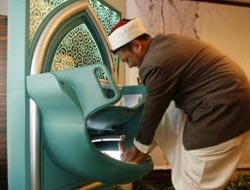A Malaysian company has invented a machine it says will help Muslims purify themselves before prayers without excessively wasting water.
The ornate, green-coloured machine comes with automatic sensors and basins to curb water usage during wudu, an Arabic word used to describe the act of washing the face, arms and legs before prayers.
The wudu, or ablution, rite preceeds the five daily prayers Muslims are obligated to perform. There are more than 1.7 billion Muslims in the world, with the majority in Africa and the Middle East where water supplies are scarce.
Inventors AACE Technologies is counting on rich countries in these two regions to snap up the machines that will be available in the next six months and cost $3,000-$4,000 a piece.
"Saving water is a motivation for people to adopt this system rather than the conventional methods, where there's a lot of water wastage," AACE Chairman Anthony Gomez told reporters while launching the product in the Malaysian capital.
The device, which also emits recorded Koranic verses and is 1.65 metres tall, only uses 1.3 litres of water compared to the conventional methods, which usually involve leaving faucets running for the duration of the washing ritual, which can last for several minutes, Gomez said.
"During the Haj, two million people used 50 million litres water a day for wudu. If they introduce this machine they are saving 40 million litres per day," he said, referring to the annual Muslim pilgrimage to Mecca.
The Gulf city of Dubai has shown interest in acquiring the product for its airport, Gomez said, adding that the machine took two years to develop at the cost of $2.5 million.
AACE also wants to target mosques and offices with new models that can be wall mounted in a group of six.
Muslims heading for prayers in mainly Muslim Malaysia had mixed feelings about the high-tech, but pricey, invention.
"The idea is good and it is built in line with Islamic teachings. But water in this country is cheap, so it is still not worthwhile to have this machine," an officeworker who gave his name as Aminuddin told Reuters.
But a tourist from neighbouring Singapore, which has little water supplies, said the machine would help conserve natural resources.



